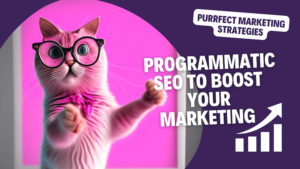Today we discuss programmatic SEO: what it is and how it can boost your marketing performance.
I have written other articles around the topic of programmatic SEO, as I am personally a huge fan.
Check out the article where I present a case study on how to use ChatGPT for a Programmatic SEO project.
Many big companies leverage programmatics to improve their rankings and reach to a wider audience. In this post I show the top best-in-class examples of programmatic SEO to get some inspiration for your project.
Also, here you have a tutorial on how to generate local pages with programmatic SEO. There I show you the exact plugins and process to build multiple pages in one go, in a step-by-step comprehensive tutorial.
And finally, once that you have your site built, have a look at how to make the most out of it with the best programmatic SEO strategies for monetisation.
But today, we are covering the basics – the fundamentals of what you need to know about this powerful technique.
What is programmatic SEO?
Programmatic SEO refers to the practice of using automated and data-driven techniques to optimise and improve search engine optimization (SEO) efforts. It combines the principles of programmatic advertising, which involves the automated buying and selling of digital advertising, with SEO strategies to enhance organic search visibility and performance.
Programmatic SEO utilises technology, algorithms, and data analysis to streamline and optimise various aspects of SEO, such as keyword research, content creation, on-page optimization, link building, and performance tracking. It aims to improve efficiency, accuracy, and scalability in implementing SEO tactics.
Here are some key aspects of programmatic SEO:
Data-driven approach:
Programmatic SEO relies on data analysis to identify trends, user behaviour, and search patterns. This data is used to make informed decisions about targeting keywords, creating content, and optimising various elements on a website.
Automation:
Programmatic SEO leverages automation tools and algorithms to carry out SEO tasks more efficiently. It can automate processes like keyword research, content generation, metadata optimization, and reporting, saving time and reducing manual effort.
Dynamic optimization:
Programmatic SEO allows for real-time adjustments and optimizations based on performance data. It enables dynamic changes to website elements, such as titles, headings, meta tags, and content, to improve search rankings and user experience.
Personalization:
By analyzing user data, programmatic SEO can deliver personalised content and experiences to target specific audience segments. This helps enhance relevancy, engagement, and conversion rates.
Performance tracking:
Programmatic SEO employs advanced analytics and reporting tools to monitor and measure the impact of SEO efforts. It provides insights into key performance indicators (KPIs), such as organic traffic, rankings, click-through rates, and conversions, allowing for data-driven decision-making and continuous improvement.
Overall, programmatic SEO combines the power of automation, data analysis, and optimization techniques to enhance the effectiveness and efficiency of SEO campaigns, ultimately driving organic search visibility and improving website performance.
If you would like some help to organise the great deal of content that you will have with programmatic SEO, download here my favourite marketing content strategy template. Or even better, the SEO content template.
How to use programmatic SEO: Case Study in an e-commerce site:
Here’s a specific example of programmatic SEO project that I had the chance to work on for one of my clients.:
They had an e-commerce website selling a wide range of products. They wanted to optimise their website’s organic search visibility and drive more targeted traffic to your product pages. With programmatic SEO, you can employ automated techniques and data-driven strategies to achieve this goal.
Keyword Research:
We used programmatic SEO tools to analyse search trends, competition, and user intent. Based on this data, we were able to identify high-potential keywords with a good balance of search volume and relevance to their products.
Content Generation:
Programmatic SEO can automate the generation of product descriptions, titles, and meta tags using structured data and templates. This ensures that each product page has unique and optimised content without requiring manual effort for every product.
On-Page Optimization:
Programmatic SEO tools can automatically analyse and optimise various on-page elements, including headings, URLs, image alt tags, and internal linking structures. This ensures that your product pages are properly optimised for search engines, improving their visibility and relevance.
Dynamic Pricing:
If your e-commerce platform offers dynamic pricing, like in the case of this client, programmatic SEO can integrate with your pricing system to automatically update and optimise pricing information on product pages. This can include generating structured data markup for price updates, displaying discounts or promotions, and ensuring accurate and up-to-date pricing information for search engines. A real time saver!
Performance Tracking:
Programmatic SEO tools provide real-time analytics and reporting, allowing you to track the performance of your product pages, monitor keyword rankings, measure organic traffic, and analyse conversion rates. This data helps you make data-driven decisions and identify areas for further optimization.
Personalization:
Programmatic SEO can leverage user data, such as browsing history, purchase behaviour, and demographics, to deliver personalised product recommendations or dynamically generate content based on individual preferences. This enhances the user experience and increases the likelihood of conversions.
By implementing programmatic SEO techniques in this example, you can automate and optimise various aspects of your e-commerce website’s SEO, resulting in improved search visibility, targeted traffic, and ultimately, increased sales and revenue.
Most popular SEO tools offer programmatic SEO tools, like SEMrush, Moz, Ahrefs, BrightEdge, DeepCrawl, Botify and CognitiveSEO.
Programmatic SEO does not apply to e-commerce only. If you have a content-based niche website monetized through advertising, programmatic SEO can play a significant role in optimising your website’s performance and increasing revenue.
If you are looking forward to getting started with programmatic SEO, here is a real case study on how I applied programmatic SEO with the help of ChatGPT.
See you soon my lovely human friends.
Missing me already, dear human? You can find me on X and Facebook.
Moxie

